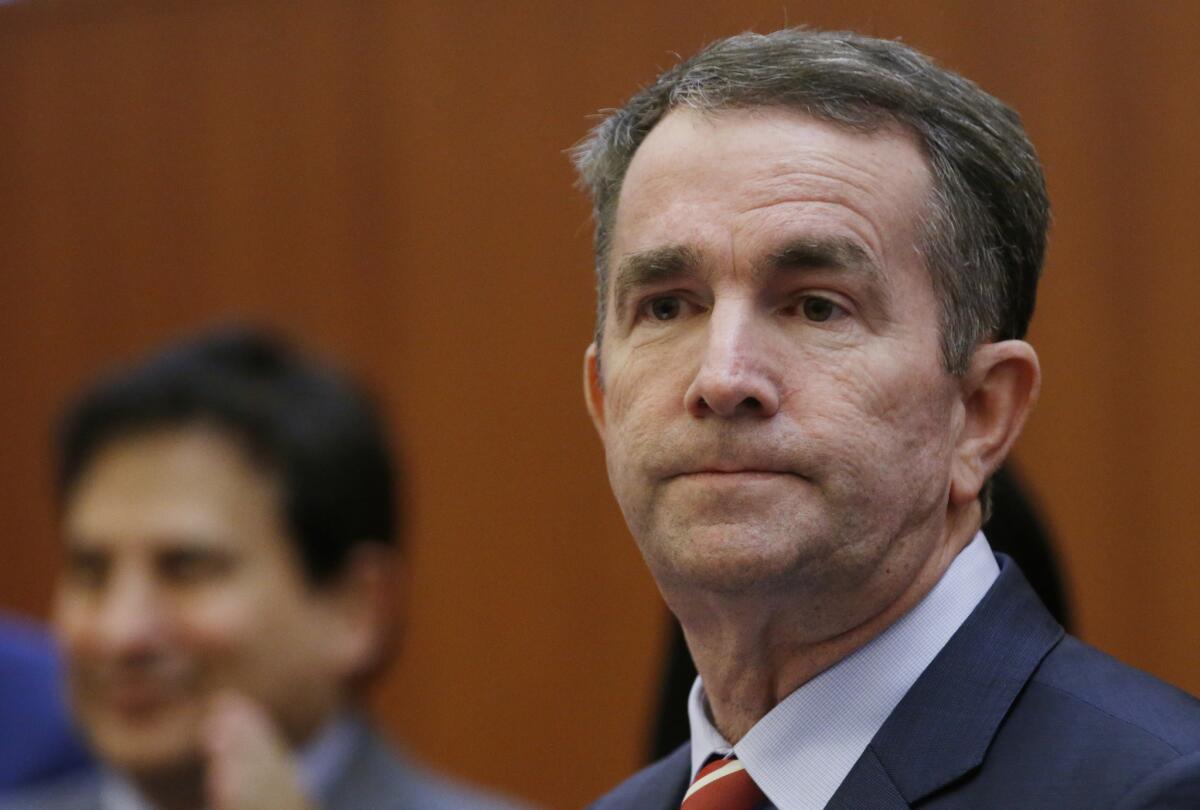Editorial: 2nd Amendment sanctuaries are acts of faithlessness in government

Nearly two years ago, the governing board of Effingham County, Ill., passed a resolution declaring itself a “sanctuary county” and barring “employees from enforcing the unconstitutional actions of the state government.” Those actions? Gun control laws, which are resoundingly unpopular in the rural county some 215 miles south of Chicago.
Since then, more than 400 other local jurisdictions in 20 states (including the city of Needles here in California) have adopted similar resolutions, some with more bite than others, but all in defiance of the law.
The simple fact is: Local governments cannot decide willy-nilly that if they don’t like a state law, they don’t have to enforce it. While states may have powers unique from the federal government’s, no such duality exists at the municipal level. Cities have only the powers granted to them by their states.
The 2nd Amendment sanctuary movement adopted its name as an obvious play on the immigration sanctuary movement. But those movements are related in name only, and it is possible to support the latter without supporting the former. Immigration codes, after all, are part of federal civil law, not criminal law, and local jurisdictions have the right to decide that they don’t want to use local tax dollars to enforce federal civil codes. They may not impede the federal government’s ability to enforce its immigration codes, but they don’t have to cooperate.
The 2nd Amendment sanctuary movement, by contrast, involves local authorities seeking to negate state criminal laws governing who can own a firearm and under what conditions. Those are laws that are by definition supposed to be enforced by local police agencies. And unlike situations where laws are not enforced because of so-called “prosecutorial discretion,” the gun sanctuary jurisdictions are not claiming that a lack of resources keeps them from enforcing the laws, but merely that they don’t agree with the laws.
Many of the jurisdictions seem to recognize that they lack the authority to ignore the state laws, so they frame their resolutions somewhat ambiguously — if a gun law is unconstitutional, it won’t be enforced. But they don’t spell out what, in their opinion, makes a law unconstitutional or who gets to decide. So it’s as much political theater as anything else, a baring of the teeth against disliked laws, but rarely one that amounts to much.
Yet it’s still dangerous because it represents a further fraying of the national fabric. Democracy works only as far as people have faith in it. If local jurisdictions dislike state laws, there are democratic mechanisms for changing them. Laws that have been duly passed and enacted should be followed; that’s what the rule of law means. We can make exceptions for prosecutorial discretion or for truly reprehensible laws — Jim Crow laws come to mind. Gun laws, however, do not fall into that category, and this move to flout them is a display of faithlessness in our democracy.
Democrats in Virginia recently took control of the state Legislature, and with a pro-gun-control governor they are working on a slate of pragmatic laws including mandatory background checks for all gun sales, a “red flag” law allowing guns to be confiscated from people deemed a risk to themselves or others, a measure allowing local officials to ban firearms from public events and government buildings, and a one-per-month limit on handgun purchases. But on the local level, more than 100 Virginia counties and cities have adopted 2nd Amendment sanctuary resolutions.
On Monday, pro-gun groups opposed to the state measures plan to gather at the Capitol building in Richmond for a rally and a “lobbying day,” and many are expected to be armed (Virginia is an “open carry” state). Organizers also invited out-of-state self-styled militias to take part. So there will be a throng of politically motivated people carrying arms descending on a seat of government power. That rings more of intimidation than democratic expression.
Virginia officials fear a repeat of the August 2017 Unite the Right rally in Charlottesville that led to violent confrontations between far-right, neo-Nazi and white supremacist demonstrators, and the people who protested them. It culminated in the death of one protester and significant injuries to more than two dozen other people who were mowed down by a car driven by a neo-Nazi from Ohio. So nervous are state officials about another outburst of violence that Gov. Ralph Northam declared a state of emergency and barred firearms and other weapons from the capitol grounds until Tuesday, the day after the rally. And their concerns seem warranted: On Thursday, FBI agents filed illegal weapons and other charges against three members of a white supremacist group who reportedly had discussed attending the rally.
We all have the right to protest or mount a demonstration, and pro-gun advocates are no different until their demonstrations cross the line into acts of violence or physical intimidation. Local governments also have a right to dissent from laws they dislike, and to lobby for changes. That is how democracy works. But it is irresponsible for local jurisdictions to pick and choose which laws they will enforce, especially when such stances undermine the legitimacy of a democratically elected government and play into the hands of extremists.
More to Read
A cure for the common opinion
Get thought-provoking perspectives with our weekly newsletter.
You may occasionally receive promotional content from the Los Angeles Times.










